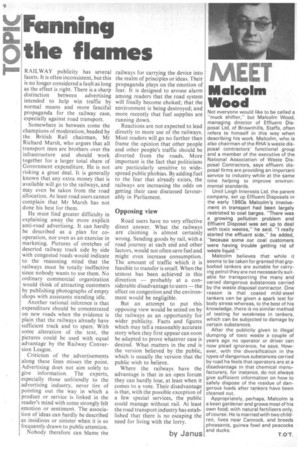Fanning the flames
Page 80

If you've noticed an error in this article please click here to report it so we can fix it.
RAILWAY publicity has several facets. It is often inconsistent, but this is no longer considered a fault as long as the effect is right. There is a sharp distinction between advertising intended to help win traffic by normal means and more fanciful propaganda for the railway case, especially against road transport.
Somewhere in between come the champions of moderation, headed by the British Rail chairman, Mr Richard Marsh, who argues that all transport men are brothers over the infrastructure and should work together for a larger total share of Government expenditure. He is not risking a great deal. It is generally known that any extra money that is available will go to the railways, and may even be taken from the road allocation. At least road users cannot complain that Mr Marsh has not done his best for them.
He must find greater difficulty in explaining away the more explicit anti-road advertising. It can hardly be described as a plan for cooperation, nor even as an exercise in marketing. Pictures of stretches of deserted railway track side by side with congested roads would indicate to the reasoning mind that the railways must be totally ineffective since nobody wants to use them. No ordinary commercial organization would think of attracting customers by publishing photographs of empty shops with assistants standing idle.
• Another rational inference is that expenditure should be concentrated on new roads when the evidence is plain that the railways already have sufficient track and to spare. With some alteration of the text, the pictures could be used with equal advantage by the Railway Conversion League.
Criticism of the advertisements along these lines misses the point. Advertising does not aim solely to give information. The experts, especially those unfriendly to the advertising industry, never tire of pointing out the way in which a product or service is linked in the reader's mind with some strongly felt emotion or sentiment. The association of ideas can hardly be described as insidious or sinister when it is so frequently drawn to Public attention.
Nobody therefore can blame the railways for carrying the device into the realm of principles or ideas. Their propaganda plays on the emotion of fear. It is designed to arouse alarm among readers that the road system will finally become choked; that the environment is being destroyed; and more recently that fuel supplies are running down.
Reactions are not expected to lead directly to more use of the railways. Most readers will go no further than frame the opinion that other people and other people's traffic should be diverted from the roads. More important is the fact that politicians are particularly sensitive to widespread public phobias. By adding fuel to the fear that already exists, the railways are increasing the odds on getting their case discussed favourably in Parliament.
Opposing view
Road users have no very effective direct answer. What the railways are claiming is almost certainly wrong. Sending goods by rail, with a road journey at each end and other factors, would not often save fuel and might even increase consumption. The amount of traffic which it is feasible to transfer is small. When the utmost has been achieved in this direction — probably at a considerable disadvantage to users — the effect on congestion and the environment would be negligible.
But an attempt to put this opposing view would be seized on by the railways as an opportunity for wider publicity. Facts and figures which may tell a reasonably accurate story when they first appear can soon be adapted to prove whatever case is desired. What matters in the end is the version believed by the public, which is usually the version that the public wish to believe.
Where the railways have the advantage is that in an open forum they can hardly lose, at least when it comes to a vote. Their disadvantage is that, with the possible exception of a few special services, the public could manage without rail. At least the road transport industry has established that there is no escaping the need for living with the lorry.
by Janus




























































































































































